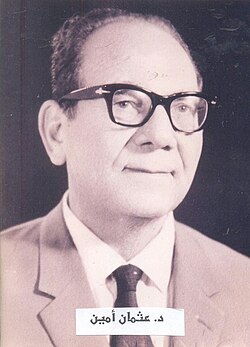



Othman Amin (1905 – 1987), one of the leaders of the modern Islamic philosophical school founded by Al-Sheikh Mustafa Abulraziq, he is well known by his spiritual or subjective view of 'Internalism' (Al-Gowanya in Arabic)
Othman Amin was born in a village in Giza governorate and raised in a village family most of its members works in agriculture. His father Muhammad Amin preserved Al-Qur'an and used to read religious books in addition to working in agriculture and commerce.
Within this conservative environment Othman Amin has been grown up and preserved part of Al-Qur'an by his father. He studied in elementary and preparatory school near his village and studied in the secondary school in Cairo. After getting the secondary school certificate he enrolled in the college of literature at Fou'ad first University (Cairo University now), and chosen the philosophy department for study.
During his study he met Al-Sheikh Mustafa Abdulraziq and under his supervision and direction he read parts of the writings of the major Islamic philosophers such as Ibn Rushd, Ibn Sina and Al-Farabi.
He got the license in literature on 1930 afterwards he left to Paris in a University mission to study for Ph. D. He defended his thesis about Al-Sheikh Muhammad Abduh successfully after seven years of study. After his return to Egypt he taught at Cairo University and became a university professor and finally the director of the philosophy department.
In addition to Cairo University he gave lectures in other universities; he also taught at other universities as a visiting professor, in Lybia, Sudan, Pakistan as well as the American University in Cairo. Othman Amin has been elected as a member of the convention of the Arabic language, as well as an honorary member in the French Cartesian Society.
In his work "excerpts from contemporary Arabic Literature", the well known Orientalist Jack Perk has reserved a space to acknowledge the philosophical works of Othman Amin. Whereas he was described by professor Ibrahim Bayoumi Madkour the president of the convention of the Arabic language as one of the builders of contemporary Arabic philosophy.
The philosophy of Internalism (Al-gowanya) is his own philosophy which he formulated and embraced after self contemplation and deep readings in philosophy books. It is a philosophy that sees peoples and things in a spiritual view, sees the inner reality not the outer appearance, searching for the internal after observing the external.
In his view such a philosophy represents a combinatory view between subject and object, between reason and heart and between metaphysics and science. It also calls in thought and behavior for pure and ethical intentions, the equality between the hidden and the announced, and giving up hypocrisy, in short it calls for a truly ethical live in which the human being is true with himself and free from alienation.
'Al-Gowanya' in his view is a revolutionary philosophy that aims basically to fulfill two goals in the development of our history: first to review our heritage and reassess it, second, move forward toward the future and prepare for it. He also believes that his philosophy is in no contradiction with mind or science, but it accompanies them and exceeds them toward the mystical experience to uncover what they can not reach. Hence his philosophy is close to religion and in his specific case has emanated also from contemplation of the verses of Al-Qur'an and the sayings of the Prophet Muhammad.
Othman Amin has expressed his philosophy in a book titled with the same name 'Al-Gowanya' in which he made application of it in different fields such as philosophy of language and Islamic ethics.
His scientific and philosophical research was abundant and divers, among his most important works:
· Muhammad Abduh the leader of the Arabic Thought
· Descartes
· The Stoic Philosophy
· Islamic Sects and Personalities
· Philosophical Endeavors
· Schaller
· Leaders of the human consciousness in the Islamic east
Translations:
· "A defense of science", Albert Maier
· "Contemplations in first philosophy", Rene Descartes
· "Principles of philosophy", Rene Descartes
· "the Future of humanity", Karl Jaspers
· "in Philosophy and Poetry", Martin Heidegger
Editing
He participated in editing of:
· Four chapters of 'the Islamic encyclopedia' printed in Lahore, Pakistan 1960.
· 'The history of Islamic thought' printed in Holland 1958.
· 'Contemporary middle east' printed in New York 1965.